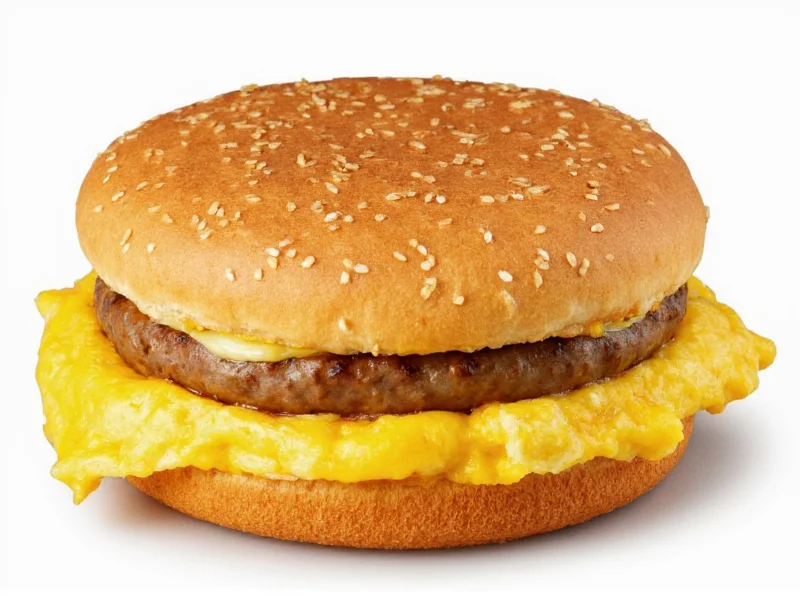Nutritional Breakdown of the Sausage Egg Cheese McGriddle
Understanding the complete nutritional profile of fast food items helps make informed dietary choices. The Sausage Egg Cheese McGriddle combines sausage, egg, and cheese between two griddle cakes, creating a calorie-dense breakfast option popular among McDonald's customers.
| Nutrient | Amount | % Daily Value* |
|---|---|---|
| Calories | 550 | 28% |
| Total Fat | 32g | 41% |
| Saturated Fat | 11g | 55% |
| Trans Fat | 0.5g | - |
| Cholesterol | 285mg | 95% |
| Sodium | 1100mg | 48% |
| Total Carbohydrates | 44g | 16% |
| Dietary Fiber | 2g | 7% |
| Sugars | 10g | - |
| Protein | 26g | - |
*Percent Daily Values are based on a 2,000 calorie diet. Your daily values may be higher or lower depending on your calorie needs.
Understanding the Calorie Distribution
The 550 calories in a sausage egg cheese McGriddle come from three primary components: the sausage patty contributes approximately 230 calories, the egg and cheese combination adds about 150 calories, and the two griddle cakes account for the remaining 170 calories. This distribution explains why the item contains significant amounts of both protein and carbohydrates.
When examining sausage egg cheese mcgriddle calories breakdown, it's important to note that nearly 52% of the total calories come from fat, while carbohydrates provide about 32% and protein accounts for the remaining 16%. This macronutrient profile makes it a high-fat breakfast option compared to many alternatives.
How This Compares to Daily Nutritional Needs
For someone following a standard 2,000-calorie diet, a single Sausage Egg Cheese McGriddle represents 28% of daily calorie needs. More concerningly, it provides 55% of the recommended daily limit for saturated fat and 95% of the suggested maximum for cholesterol. The sodium content (1,100mg) equals nearly half of what health organizations recommend consuming in an entire day.
Individuals monitoring their mcgriddle sausage egg cheese nutrition facts should consider these proportions when planning their remaining meals. Those with specific health conditions like hypertension or high cholesterol may want to limit consumption of this item due to its substantial sodium and cholesterol content.
Comparing to Other McDonald's Breakfast Options
When evaluating how many calories in a sausage egg cheese mcgriddle compared to similar menu items, it ranks among the higher-calorie breakfast sandwiches:
- Egg McMuffin: 300 calories
- Sausage McGriddle (without egg and cheese): 400 calories
- Bacon, Egg & Cheese Biscuit: 460 calories
- Sausage, Egg & Cheese McGriddle: 550 calories
- Big Breakfast with Hotcakes: 1,150 calories
The additional 150 calories in the Sausage Egg Cheese McGriddle compared to the basic Sausage McGriddle come primarily from the egg and cheese components. Those seeking lower-calorie alternatives might consider ordering the sandwich without cheese or requesting egg whites instead of the standard fried egg.
Practical Considerations for Health-Conscious Consumers
For those tracking their intake, understanding sausage egg cheese mcgriddle nutritional information helps make strategic decisions. The sandwich provides substantial protein (26g), which can help with satiety, but the high saturated fat content may concern heart health advocates.
Nutrition experts often suggest balancing such meals with physical activity. Burning 550 calories requires approximately:
- 60 minutes of brisk walking
- 45 minutes of water aerobics
- 30 minutes of running at 5 mph
- 40 minutes of swimming laps
When analyzing is sausage egg cheese mcgriddle healthy, the answer depends on individual dietary needs and overall eating patterns. Consumed occasionally as part of a balanced diet, it can fit within most nutrition plans, but regular consumption might contribute to excessive intake of saturated fat and sodium.
Making Informed Fast Food Choices
Fast food restaurants like McDonald's now provide detailed nutrition information, allowing customers to make choices aligned with their health goals. When ordering breakfast items, consider these strategies:
- Ask for modifications like removing cheese or requesting egg whites
- Pair higher-calorie items with lower-calorie sides like fruit instead of hash browns
- Be mindful of portion sizes - one sandwich may constitute a significant portion of your daily calorie budget
- Check nutrition information before ordering to avoid surprises
Understanding the complete mcgriddle sausage egg cheese nutrition facts empowers consumers to make decisions that align with their personal health objectives while still enjoying convenient meal options.
Frequently Asked Questions
How many calories are in a Sausage Egg Cheese McGriddle without cheese?
A Sausage Egg McGriddle without cheese contains approximately 460 calories, reducing the total by about 90 calories compared to the version with cheese.
Is the Sausage Egg Cheese McGriddle considered high in sodium?
Yes, with 1,100mg of sodium, the Sausage Egg Cheese McGriddle provides 48% of the recommended daily sodium limit (2,300mg). Individuals monitoring sodium intake should consider this substantial amount when making dietary choices.
How does the protein content compare to other breakfast options?
At 26g of protein, the Sausage Egg Cheese McGriddle offers more protein than many standard breakfast items. This represents about 52% of the daily protein needs for someone following a 2,000-calorie diet, making it a relatively protein-rich fast food breakfast option.
Can I reduce the calorie count of a Sausage Egg Cheese McGriddle?
Yes, you can reduce calories by ordering without cheese (saves about 90 calories), requesting egg whites instead of the standard fried egg, or asking for less sausage. Some customers also order the sandwich "open-faced" with just one griddle cake to cut approximately 85 calories.
How often can I eat a Sausage Egg Cheese McGriddle while maintaining a healthy diet?
Dietitians generally recommend treating high-calorie, high-sodium fast food items like the Sausage Egg Cheese McGriddle as occasional choices rather than daily staples. For most adults, consuming such items once or twice a week as part of an otherwise balanced diet with plenty of fruits, vegetables, and whole grains can be reasonable.











 浙公网安备
33010002000092号
浙公网安备
33010002000092号 浙B2-20120091-4
浙B2-20120091-4